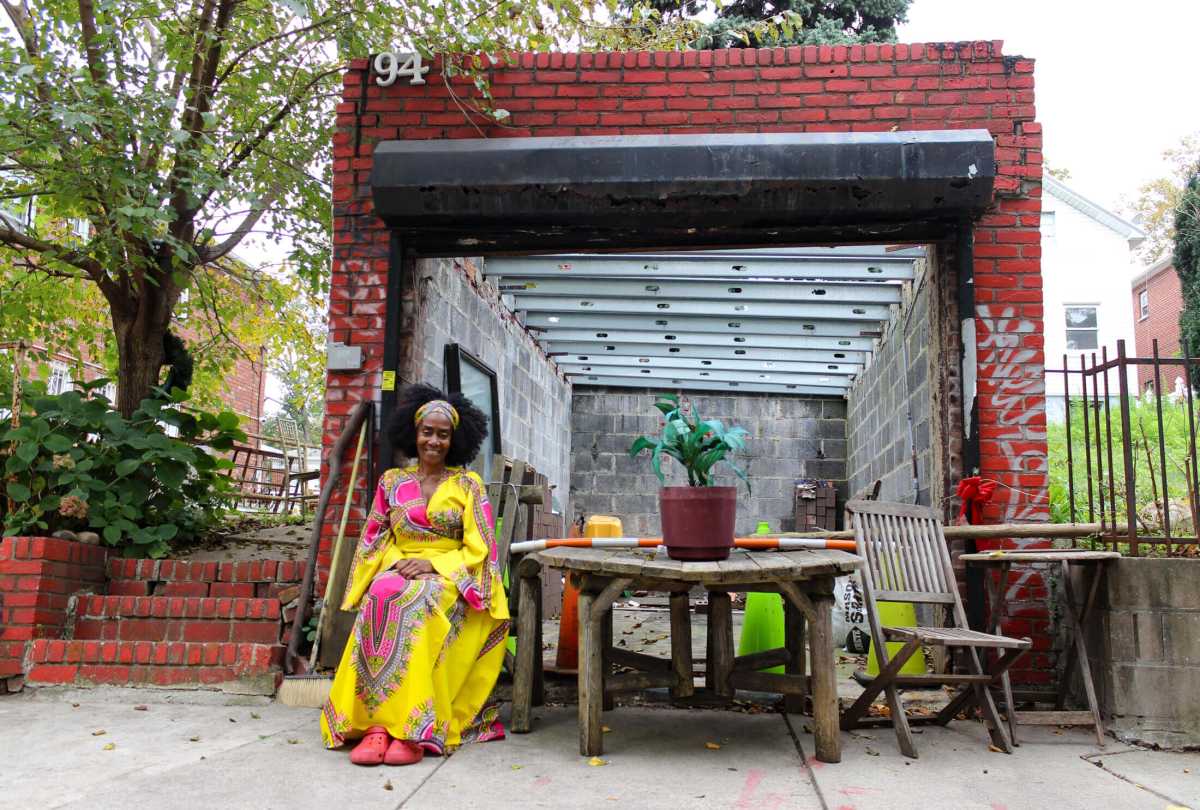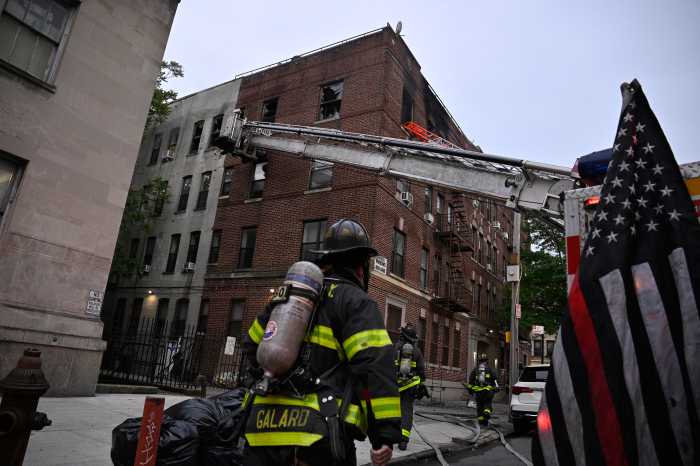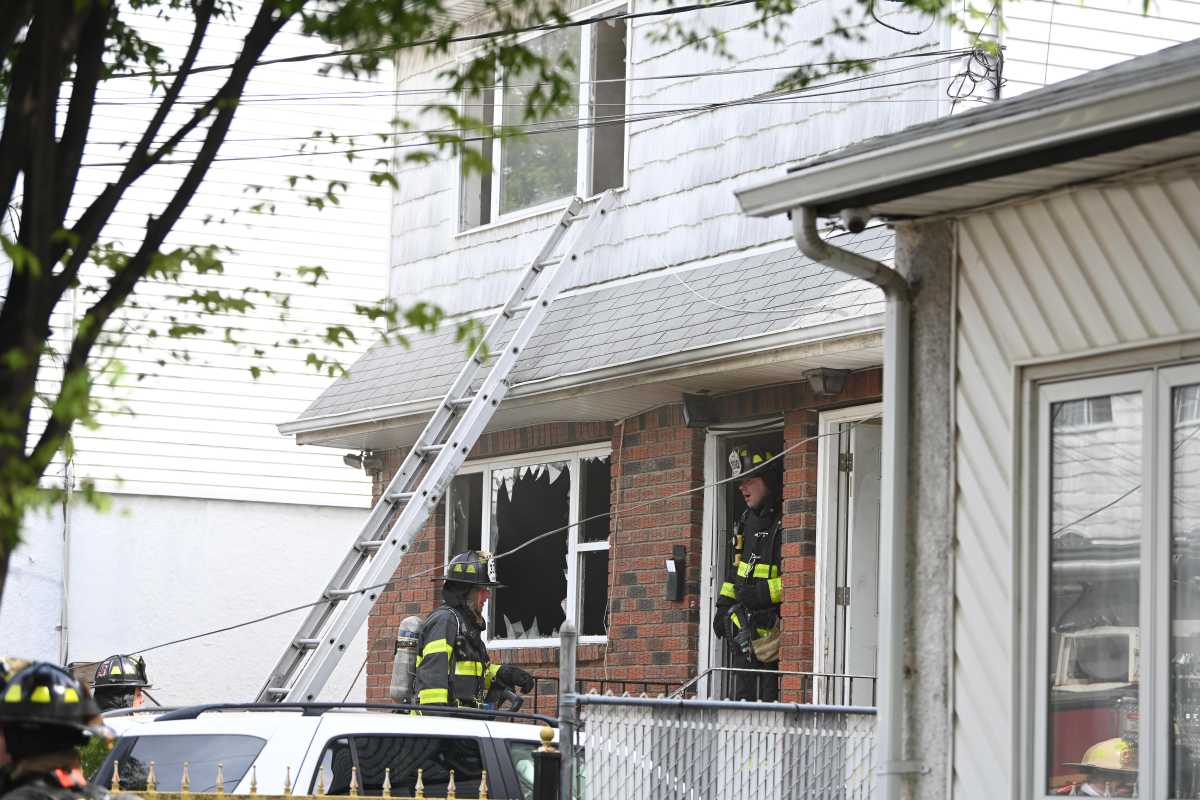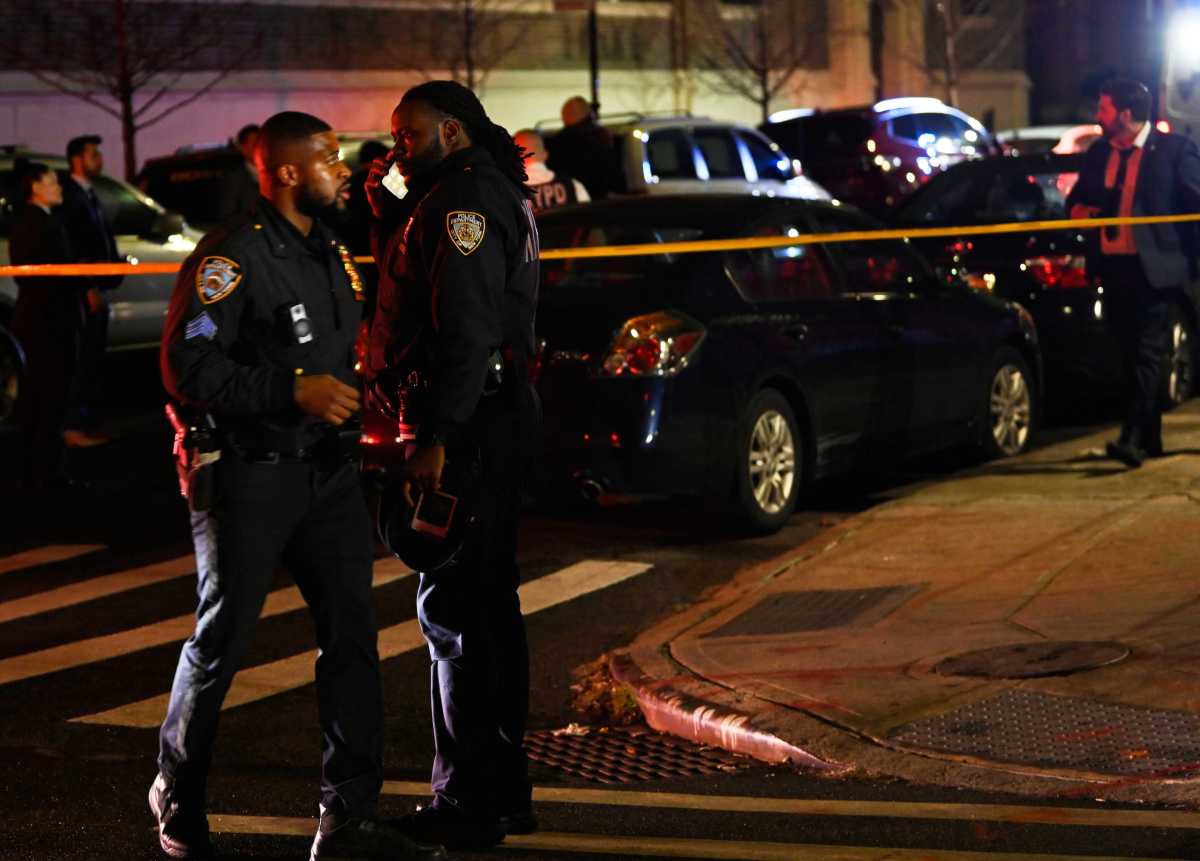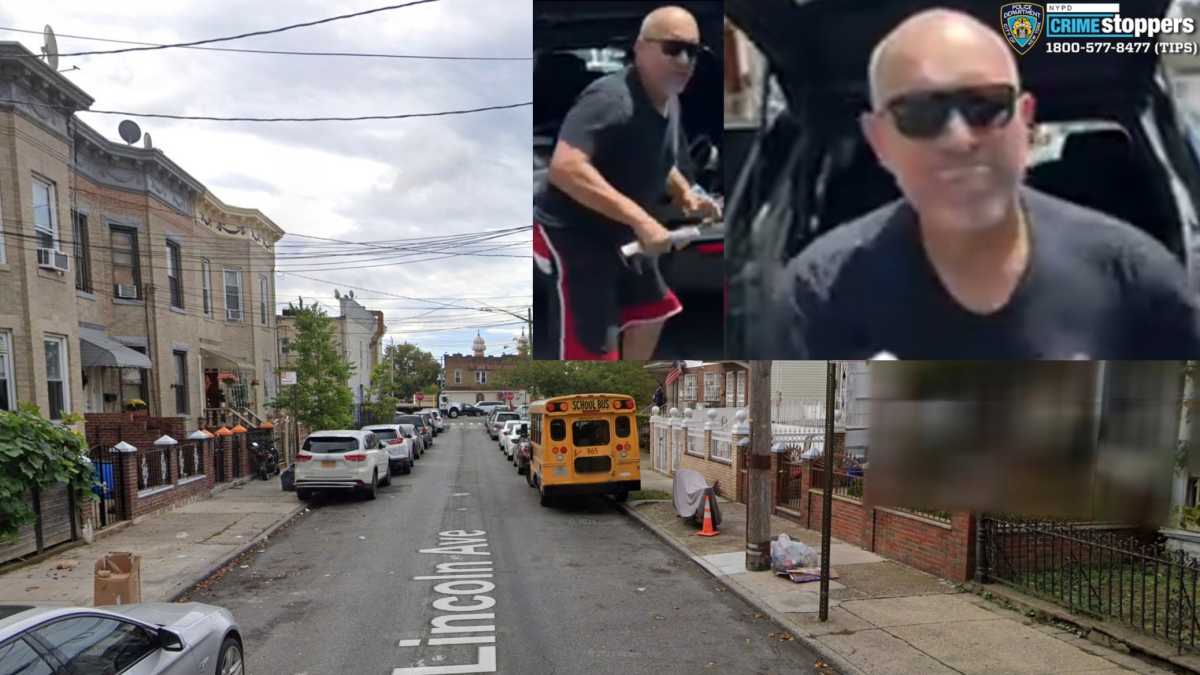Ten years ago Sybil Green, who goes by the name Tami, was biking down a stretch of Jackie Robinson Parkway’s residential frontage road, which connects Vermont Street in East New York with Highland Park, when she noticed a house that looked in disrepair, with a door ajar and a bright orange notice pasted on the front.
Green, who was homeless at the time, said she continued to bike past the house to see if anyone was living there and started talking to neighbors, who told her it had been abandoned three years earlier after the death of its longtime owner.
Walking up the path, Green said she saw the orange notice posted on the front of the building at 94 Jackie Robinson Parkway said it was being condemned by the city. Inside, she said it looked like someone had just up and left, with pots still on the stove and old food in the pantries. Cats and raccoons had taken up residence. Coincidentally, through mail and other documents, she discovered the homeowner who died in 2010, Imogene Greene, had an almost identical last name.
Green made a bold decision: She moved in and fixed up the place.
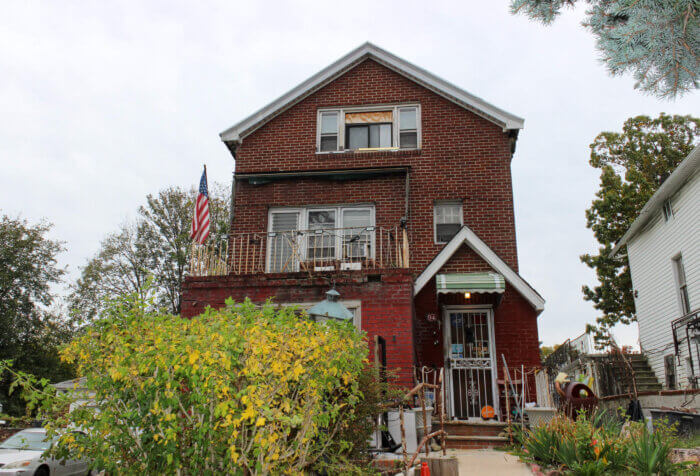
That was back in late 2013, and she said ever since she’s expected a knock on the door from one of Imogene Greene’s two sons – whom she discovered through mail and has tried to contact over the years – but no one ever came.
“I had become homeless right after the recession in 2010, 2011 and after living on the streets in New York – I had my own business, my own gym, my own place and I lost everything – it was very devastating. So I didn’t know what to do. I was homeless…then I came across the home,” she told Brooklyn Paper’s sister site Brownstoner, adding that she worked throughout the time she was homeless.
Now, ten years later, she is being evicted by a limited liability company called Jackie 42 LLC that is managed by Elliot Ambalo. Ambalo, his brother, and an associate are property flippers who are being deposed this month by the Queens Public Administrator over allegations of forged notary and heir signatures and deed fraud concerning other properties, as first reported by The City.
Brothers Elliot and Joseph Ambalo and Etai Vardi appear to have recently located Imogene Greene’s sons, and public records show the trio bought the property from them. According to The City, the trio identifies houses whose owner has died, often in predominantly Black and brown neighborhoods like East New York, and tracks down heirs to buy the properties for low amounts. They then evict tenants and flip the houses for much higher prices.
A house abandoned and in foreclosure
When Imogene Greene died in 2010, payments on the $430,000 mortgage she had taken out on 94 Jackie Robinson Parkway came to a halt. According to court filings, the bank that originally held the mortgage initiated a foreclosure in 2012. It took until 2017 for the bank (a different one than had originally filed the foreclosure after the mortgage changed hands) to amend the foreclosure filing to reflect Greene’s death and serve her heirs, sons Herman and Michael, court filings show. (Herman Greene shares a name with his late father, who was the original purchaser of the property, according to public records.)
Including interest but not fees, the payoff owed to the bank is $815,728. This exceeds the current value of the property, according to an attorney for the Ambalos and Vardi. Public sale records for properties in the area indicate it could fetch about that or more, depending on condition and other factors.
Over the following years, the bank wasn’t able to get Herman or Michael to appear in court for the foreclosure case, despite representatives from the bank visiting Michael’s Brooklyn residence and making him aware of the proceedings, the bank said in court filings. As well, the man they contacted denied he was Imogene Greene’s son, although later a woman at the address said he is and that she is his wife. Affidavits from the bank say older brother Herman has a mental disability and was in the care of his brother at some point, but the bank has not been able to locate him.
Throughout this time, Green said, she was appearing at court foreclosure hearings and telling court staff and counsel for the parties that the Greene family had abandoned the house after Imogene’s death and she was now living there.
She got the city to remove the condemnation notice after stabilizing the garage, and she made other improvements, including installing piping (some of the house’s piping may have been stolen while the house was vacant), fixing the boiler, repairing the roof, and having a large tree removed, court filings say. She also put the gas under her name.
But given she wasn’t the house’s owner, there was nothing she could do to stall the foreclosure proceeding and the case kept getting adjourned.
A sudden sale
In 2020, matters took a surprising turn. In May of that year, Michael Greene signed a contract agreeing to sell the property at 94 Jackie Robinson Parkway to The Brooklyn Foundation LLC, one of the Ambalo brothers’ many LLCs, public records researched by The City show. Elliot Ambalo was the signatory for the LLC.
Then, five months later, and after years of no involvement in the case, Greene filed an opposition to the foreclosure proceedings in Kings County Supreme Court through the law firm Shiryak, Bowman, Anderson, Gill & Kadochnikov, LLP, which is also representing the Ambalo brothers and Vardi in the case.
The statement argues that the foreclosure should be nullified because it was filed against a deceased person, and that the bank waited too long to ask for a summary judgment, which renders the case abandoned.
In June 2021, Michael’s older brother Herman Greene sold the property to the Ambalo brothers’ Jackie 42 LLC for $220,000, according to public records. The LLC filed to evict Green in August that year, a motion that was granted despite Green trying to fight in it court.
Adverse possession
Although not explicitly named in the foreclosure lawsuit, Green filed papers in the Supreme Court case, which had stalled from 2020 to mid-2022 due to the pandemic and subsequent moratoriums, asking the court to stay her eviction in housing court while the foreclosure lawsuit was decided.
In court filings for the eviction case, she has challenged Jackie 42 LLC’s ownership of the house. “The deed has fatal flaws: Herman Greene Senior is dead, and did not sign anything in 2021” and “Herman Greene Jr. is mentally disabled,” she said, meaning he appears not to have had the capacity to sign over the deed given testimony in prior court affidavits.
Green said she questioned how Jackie 42 LLC was able to contact the brothers and get them to agree to sign over the house, and why they were suddenly interested in being involved in the foreclosure case more than eight years after the case was first filed.
In the court filings, she also called on the court to grant her quiet title to 94 Jackie Robinson Parkway through adverse possession.
Adverse possession is a rarity in modern day property law, as it requires someone to occupy someone else’s property openly and adversely for 10 years or longer before a claim can be made. According to state law, occupancy has to be “adverse, under claim of right, open and notorious, continuous, exclusive, and actual.”
Joshua Price of Price Law Firm, who is not involved in the proceedings but whose practice includes adverse possession, said adverse possession cases in New York are most commonly seen over disputed property lines rather than entire properties, and said the law is one less favored by the courts.
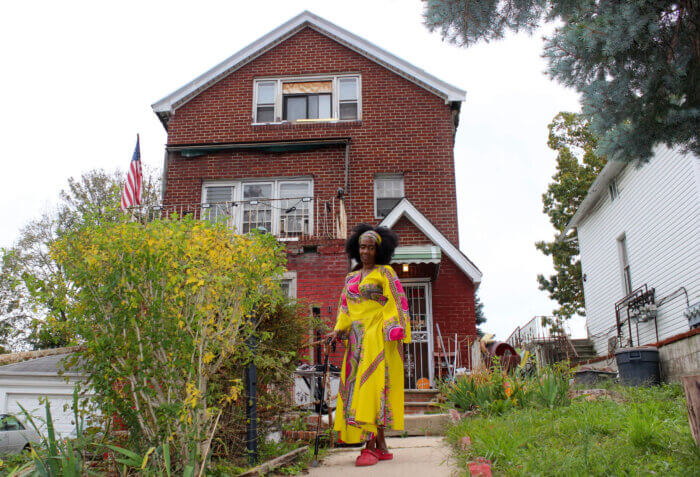
“The standard that someone claiming adverse possession has to meet is more difficult than in the typical case,” he said. “If it’s a car accident case, you have to win by a preponderance of the evidence, so that means basically 50 percent. If it’s an adverse possession case, you have to prove by clear and convincing evidence, and I can’t put a number on that..but it’s much more than just a preponderance of the evidence.”
Green, who is representing herself in the foreclosure and eviction proceedings with help from East New York Community Land Trust, argues in her filings that she meets the requirements for adverse possession, having openly lived in the house for 10 years and having made improvements to the property. Although its appearance has changed over the years, an old tax photo shows the freestanding house and its neighbor twin could be Italianate, Gothic, or Greek Revival dating from the mid 19th century.
“This address is both my home and the place that I have been using as my business address,” she said in court filings. “I was never served with papers in the foreclosure action and ask the court to be lenient with procedural requirements in the name of fairness.”
Green said in her affidavit that without a stay on her eviction while the foreclosure case makes its way through the court system “there is significant risk that I’ll be evicted from my own home with nowhere else to go.”
A battle in court
Shiryak, Bowman, Anderson, Gill & Kadochnikov partner Mark Anderson told Brownstoner that Green had perjured herself by saying in a court filing in the eviction case that she is an heir to Imogene Greene, and regardless he argues she does not meet the legal requirements for adverse possession.
He added that she would need to file “a plenary proceeding to even attempt to obtain ownership through adverse possession.” The same would be needed to void the deed, he said, adding she would not be able to move forward with the case anyway because she is not the deed holder in the first place.
Anderson said that while he had not met Herman, his client Michael, Herman’s brother, confirmed Herman had capacity and was competent to sign his interests in the property over the Jackie 42 LLC, and that it was done in front of a notary.
Anderson added that “significant financial effort has been expended by our clients in defending the foreclosure action, commencing landlord tenant proceedings, and in opposing Sybil Green’s frivolous motions.”
Lawyers for the bank equally reject Green’s involvement in the case, saying she isn’t party to the suit and would need to seek intervention to be named in the foreclosure action before she could proceed with her claims.
In an affidavit from Michael Greene, filed in the eviction proceedings and cited by the bank’s lawyers in the foreclosure proceedings, Greene said Sybil Green was a tenant of his mother who has gone on “living for free for close to 10 years,” which would make her ineligible for adverse possession, as possession must be taken not given.
“I am asking the court to dismiss and reject all of the respondents past and future Order to Show Causes with prejudice and let the City Marshall finally evict them so Jackie 42 LLC and me can move on with our lives and let the respondents start taking accountability and responsibility for themselves,” reads the written affadavit from Michael Greene in the eviction case that the bank entered as evidence in the foreclosure case.
However, Green, in her affidavit and in an interview with Brownstoner, wholly rejects that she knew Imogene Greene before her death, had ever been to the house before 2013, and had spoken to Michael, despite trying to contact him for years.
A staple on the street
In letters to the court, neighbors describe Tami Green as a “caring, hardworking community member who put the neighborhood’s well being first.”
One resident, who has known Green for her 10 years on the block, said she first met her during a block cleanup that was just the two of them. “It seems we were on an identical mission to save our street from the barrage of garbage dumped by outsiders,” the neighbor writes. “Prior to her moving to the property, there was poor maintenance of the house and the surroundings.” And: “Tami is an amazing person, community organizer and liaison, acquaintance and has always exerted care, kindness and compassion for those around.”
A couple who have lived near Green for seven years wrote she had “consistently proven to be an outstanding and essential member of our community.” One added: “Without Sybil ‘Tami’s’ continuous efforts I firmly believe that our community would not thrive as it does today. She is an integral part of our community and her presence and commitment are invaluable.”
A resident of the close-knit area for 27 years wrote Green is a strong voice for all in the community, advocating for safety, cleanliness, and community building. She “is a true asset to our community and she has become the neighbor that every neighborhood wants and needs. That’s what she means to me and my elderly community of this Highland neighborhood.”
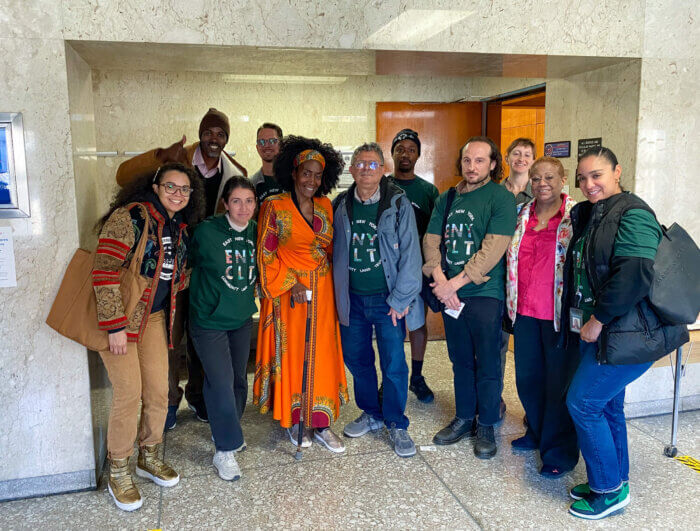
At an Oct. procedural hearing for the foreclosure case, more than a dozen supporters from East New York Community Land Trust appeared in court to support Green. Before the hearing, Green prayed out loud. She said her family prayer that she has prayed with her sons for the last 10 years has been for God to bless 94 Jackie Robinson Parkway from its roof to its foundation, to make it a home of love, peace, and refuge, and to bring the title under her name.
“It has been 10 years saying that prayer, and if all titles and deeds are in my name, I will have to say it’s a miracle,” she said.
The foreclosure case will be back in court on December 6. Green said at this stage she will still be representing herself in the case, with the assistance of ENYCLT.
Brownstoner reached out to Elliot Ambalo through his company Premier Properties multiple times with detailed questions, but did not get a response. Brownstoner also tried to reach Michael Greene, but did not hear back by publication.
“I operate to the letter, to the T,” Elliot Ambalo told The City in October. “Everything I do is within the law, 100 percent legal.”
A version of this story first appeared on Brooklyn Paper’s sister site Brownstoner.


